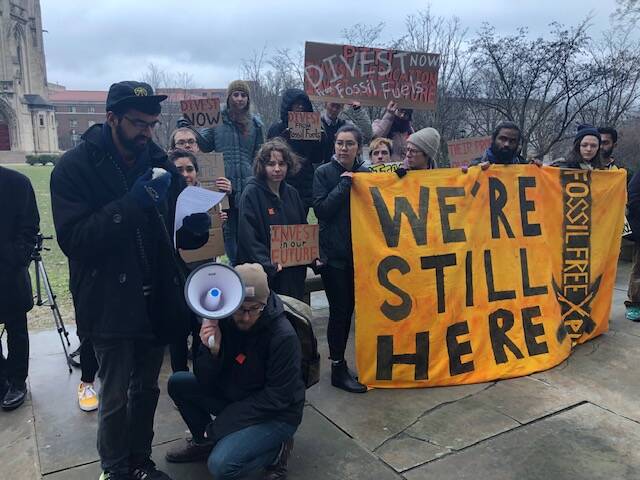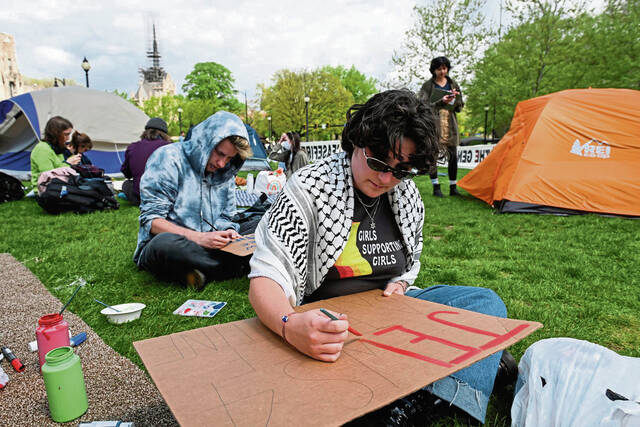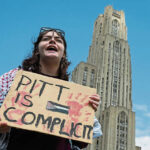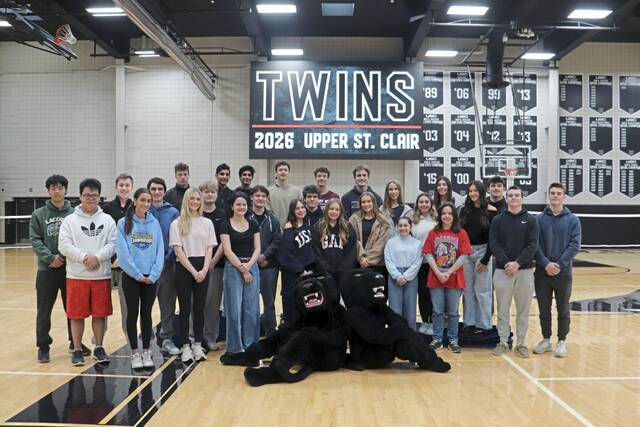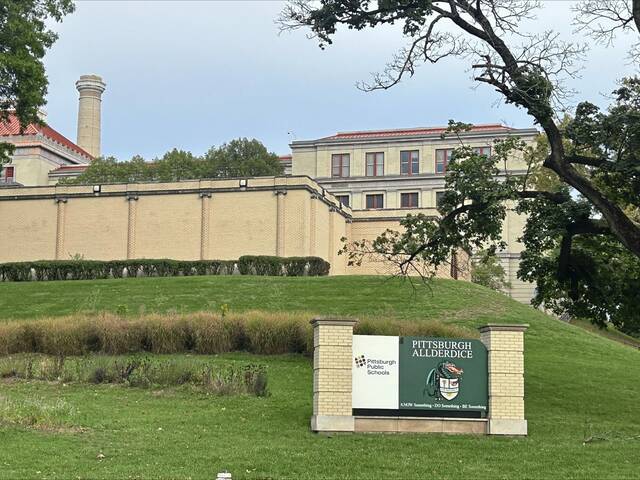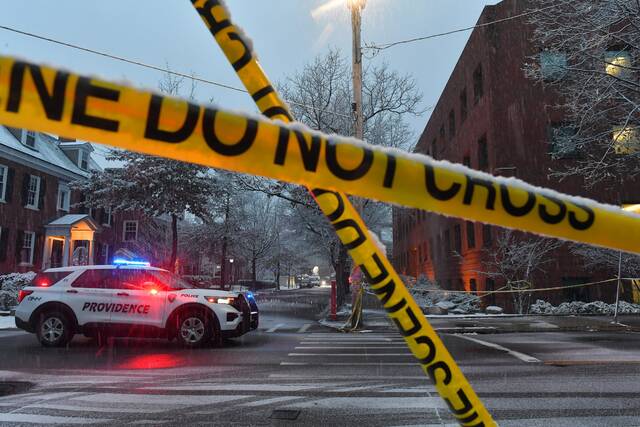Protesters yelling “divest” outside the University of Pittsburgh’s Cathedral of Learning had a bullhorn, a well-honed message and a chest-high yellow banner that read: “We’re Still Here.”
But their focus wasn’t the Israel-Hamas war. On that day in January 2020, they were demanding that Pitt rid its multibillion-dollar endowment of fossil fuel investments. The protesters’ campaign, which started in 2014, was taking far longer than they hoped.
The experience may be instructive today, both for protesters seeking a quick answer to what they call Israel’s genocidal war, and for universities focused on simply getting through this month’s commencement season.
Convincing schools to shed investments in companies that harm the environment — or, in this latest case, companies that support Israel’s military campaign in Gaza — are often protracted struggles.
If pro-Palestinian encampments that disrupted campuses this spring reappear in the fall in the thick of the presidential election, will universities be ready for intense pressure they will face from both sides of the conflict?
An official with the Foundation for Individual Rights and Expression said colleges and universities should think ahead.
“It wouldn’t hurt if over the summer, administrators take this time to maybe come up with a plan or brainstorm to figure out ways they can balance students’ and faculties’ right to protest and the right to freedom of expression, while also making sure that the campus remains free of substantial disruption and violence,” said Haley Gluhanich, a lawyer and senior program officer with the Philadelphia-based foundation that focuses on campus free-speech issues.
University investments
Endowments are massive, complex donor-driven pools of wealth whose underlying assets can be murky. Many schools, Pitt among them, say their specific investments are confidential. Today, Pitt’s endowment is valued at $5.5 billion.
Income they generate funds scholarships, professorships, athletic programs and other campus endeavors not covered by tuition or annual gifts. By doing so, they advance their institutions’ missions.
Even so, some students, faculty and outside activists say schools should invest in ways not only lucrative but also socially responsible. It’s a movement stretching back decades from South African apartheid policies in the 1980s to tobacco products and rainforest preservation.
The Oct. 7 terrorist attack on Israel by Hamas left 1,200 dead and 250 taken hostage. It was followed by a punishing military assault by Israel that has killed upward of 34,000 Palestinians, according to health officials there.
Innocents in Israel were slaughtered, as were Palestinians caught in cities pounded by Israeli airstrikes. Images of the carnage spread by social media have inflamed college campuses in the U.S., with sympathies tilting toward Palestinians.
In recent weeks, pro-Palestinian protesters on campuses including Pitt’s have demanded that their schools disclose financial and other ties to Israel. They want those schools to shed investments in defense, tech and other interests seen as supporting Israel’s war on Hamas, or more broadly, Jewish settlements in the West Bank.
Police have arrested an estimated 2,500 students and others on about 50 campuses, among them Columbia University, UCLA, the University of Virginia and Arizona State University, according to a tally by the Associated Press.
At Columbia, the epicenter of protests this spring, New York City police removed protesters from an occupied building and pushed others off campus. At UCLA, the images were more dire, with protesters and counterprotesters locked in pitched battles with one another, some armed with sticks.
Most schools have resisted calls for divestment from Israel.
Negotiations with students
But some have shown movement in recent days.
Brown University, for instance, struck a deal with its students to end their encampment April 30 in return for a meeting with five members of Brown’s corporation this month to make their case for divestment. A divestment vote could take place in the fall.
“The devastation and loss of life in the Middle East has prompted many to call for meaningful change, while also raising real issues about how best to accomplish this,’’ Brown president Christina H. Paxson wrote in a message to campus. “Brown has always prided itself on resolving differences through dialogue, debate and listening to each other.
“I cannot condone the encampment, which was in violation of university policies. Also, I have been concerned about the escalation in inflammatory rhetoric that we have seen recently, and the increase in tensions at campuses across the country.”
But, she added, “I appreciate the sincere efforts on the part of our students to take steps to prevent further escalation.”
In Pittsburgh, a weeklong pro-Palestinian encampment on Schenley Plaza near Pitt ended April 30 with relatively little trouble and two arrests. One reason is communication before and during the demonstration between Pitt staff and protesters, and willingness to at least talk, said university Senate President Robin Kear.
“I think that they have opened a dialogue that I hope will continue into the fall term,” she said.
But finding common ground with protesters can mean backlash from donors and politicians.
At Brown, a major donor, billionaire Barry Sternlicht, paused donations to the university, telling The New York Times he considered the corporation’s move unconscionable.
Meanwhile, decisions by Northwestern and Rutgers universities to hear out pro-Palestinian protesters drew a blistering response from U.S. Rep. Virginia Foxx, R-N.C., chair of the House Committee on Education and the Workforce.
She said leaders of both universities have been added to a modified list of witnesses for a May 23 hearing before her committee. The hearing has been dubbed “Calling for Accountability: Stopping Antisemitic College Chaos.”
“Over the last several days, the presidents of Northwestern and Rutgers have made shocking concessions to the unlawful antisemitic encampments on their campuses,” Foxx said in a statement issued Monday. “They have surrendered to antisemitic radicals in despicable displays of cowardice.
“As a result of these gravely concerning actions, the Committee believes it’s necessary to reevaluate the scope of the May 23 hearing and bring in the presidents of Northwestern and Rutgers — along with UCLA — to testify before the Committee.”
During the past decade at Pitt, a collection of student groups, known as the Fossil Free Pitt Coalition, spearheaded fossil fuel divestment efforts that led to a report on the topic in 2021 by an ad hoc committee.
Ultimately, Pitt’s Board of Trustees voted in February 2021 to continue reducing its endowment holdings in fossil fuels to near zero by the end of 2035.
Activists wanted immediate divestment, but officials said most of Pitt’s private equity investments are in funds with long-term commitments. As such, they could not be sold in secondary markets without expecting significant financial loss.
Pitt’s endowment is not invested directly in individual stocks. Instead, it runs through institutional funds and thus involves vehicles including mutual funds. Officials say restricting a portfolio by eliminating some investments or overweighting others could negatively affect returns.
Some say the pro-Palestinian protests have crossed a line into antisemitic spectacles that have made Jewish students fearful on their own campuses.
State Sen. Steve Santarsiero, D-Bucks, said he is a strong believer in education funding. But he’s so troubled by this spring’s campus protests, he may reintroduce legislation from 2015 barring the state from funding any university that divests from Israel.
“These protests are not about peace,” said Santarsiero, who is Jewish. “If this was merely about advocating for protection of innocent civilians, it would not spill over into chants of, ‘From the river to the sea.’ ”
The expression, usually followed by “Palestine will be free,” is viewed by many as a call to eliminate Israel and eradicate Jewish people.
Santarsiero said an armed guard is now positioned at his synagogue, where he must buzz in for services.
“That should not be normal,” he said. “But, unfortunately, that’s where we are.”



